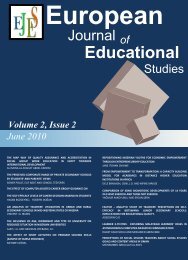Download complate issue - Ozean Publications
Download complate issue - Ozean Publications
Download complate issue - Ozean Publications
- No tags were found...
Create successful ePaper yourself
Turn your PDF publications into a flip-book with our unique Google optimized e-Paper software.
<strong>Ozean</strong> Journal of Social Sciences 2(3), 2009university community, especially the lecturers perceive the library’s roles. There will be new roles for thelibrary staff, new approaches to information access, but the library will always be there, even if it is just a bighall with a bank of a computer terminal, the ultimate electronic library. Whether its roles and whatever itsphysical attributes, the library has to be managed to enable it meet expected obligations to the university’scommunity of teachers, scholars, students and administrators. Hence, university libraries’ roles in any academicsetup can never be over-emphasized as the roles of lecturers are also vital to the academic development of anation. As pointed out, academic libraries exist to support the vision and mission of their educationalinstitutions. The academic library has a responsibility to encourage both lecturers and students to exploreinformation resources in a variety of formats as part of the research process.The topic of collegiality is not a big one in the library literature, only a small number of articles are directlylinked to this topic but this is not to say that there are not other articles which deal with <strong>issue</strong>s relating tocollegiality especially in reference services. When one talks about collegiality in academic library, it can berelated to the librarians and other administrative staff, librarians and faculty lecturers and students. A moresubstantive treatment of collegiality and reference services were done by Jones in 1997. She wrote that forcollegiality to occur, the staff must be “aware of one another’s strength to capitalize on them, be willing to learnfrom one another, trust one another, treat one another with respect and courtesy, and behave ethically”especially between the faculty lecturers and the academic librarians. Lister (2003) placed more emphasis oncollaborative tasks which include monthly practicum and reference newsletter, peer collaboration in a doublestaffing of the reference desk, and departmental participation in new staff orientation.It is the objective of this paper to discuss how collegiality can be applied in libraries which include anexamination of how faculty in a library and faculty on the other parts of campus work differently which makescollegiality more important in the library. The paper further takes a critical look at the reasons why collegialityis important in academic libraries where librarians work hand-in-hand with support staff and students andemployees. In addition, the paper will examine the importance of collegiality in an academic library and looksat some ways it can be applied especially between the librarians and faculty lecturers and more importantlywithin the university library itself.What is collegiality?Colleagues are those explicitly united in a common purpose and respecting each other's abilities to work towardthat purpose. A colleague is an associate in a profession or in a civil or ecclesiastical office. Thus, the wordcollegiality can connote respect for another's commitment to the common purpose and ability to work toward it.In a narrower sense, members of the faculty of a university or college are each other's colleagues; very often theword is taken to mean that. Sometimes colleague is taken to mean a fellow member of the same profession,(Wikipedia, 2009). The word college is sometimes construed broadly to mean a group of colleagues united in acommon purpose, According to the tenth edition of the Merriam Webster’s Collegiate Dictionary (1993);collegiality is defined as “the relationship of colleagues”. In the real sense of it, collegiality can be interpretedas the state where co-workers in an organization treat each other equally and fairly like between faculty lecturersand academic librarians on one hand, and between the librarians and other support staff in the library. But itmust be realized that not all co-workers have the same power and authority as it is indicated in the dictionarydefinition. It would appear that, in many cases, individuals use the word collegiality to mean that all employeesshould be treated fairly as human beings regardless of their role in an organization. Different individuals mayhave different levels of power but everyone is entitled to being treated in a decent and fair manner.Collegiality can also be interpreted under the stricter definition as provided by the dictionary. In this case,collegiality only applies to individuals holding the same rank or point. In this case, collegiality for universityprofessors would only be applicable when dealing with other university professors. Similarly, collegiality for asecretary would only apply when dealing with secretaries. But this paper treats the concept of collegiality asone applicable to all individuals in the library and it will relate the concept to academic library staff toencompass the relationships between librarians, support staff, and student employees, and amongst members ofthe same group and later digress to collegiality between academic librarians vis-à-vis the faculty lecturers. King(2003) wrote about a method that fostered collegiality at Oregon State University’s Valley library. In thisinstance, the reference department decided to implement a cooperative reference desk scheduling routine. Inmost libraries, a single individual makes the reference desk schedule. But the ideal thing is for all members ofthe reference team to contribute to making the schedule each week. Although this could be time consuming, theinteraction generated by action in reaching a consensus on the schedule helped to bring people together. Thereis a library literature dealing with collegiality that does not only deal with the reference desk. Myers (1991)wrote about how strikes and labour unrest can destroy collegiality in a library. Even though the libraryadministration is rarely responsible for strikes on a campus (there are usually larger umbrella <strong>issue</strong>s that get130
















